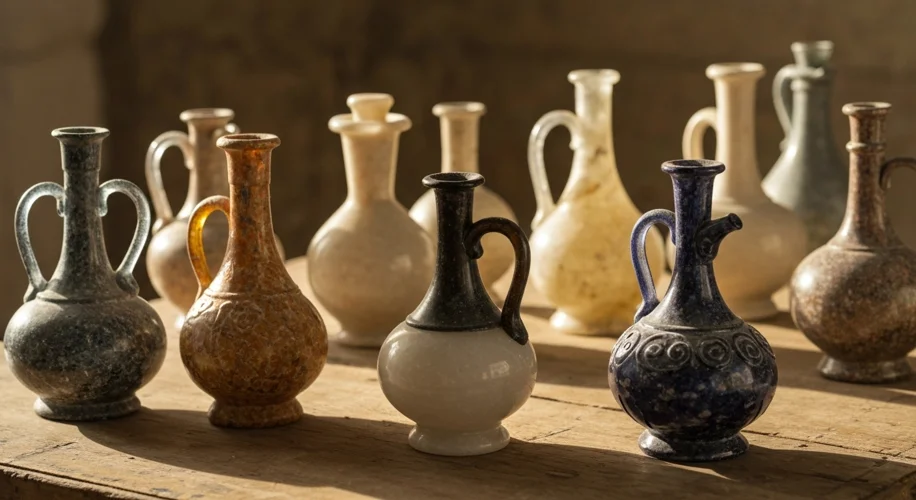Long before the advent of mass marketing and global brands, the power of scent was a potent force, weaving through the fabric of ancient societies. For the Phoenicians, a seafaring civilization renowned for its trade networks and maritime prowess, the creation and dissemination of perfumed oils, carried in exquisite vessels, was not merely a commercial enterprise but a profound vehicle for cultural exchange and identity.
From their coastal strongholds in the Levant, the Phoenicians, beginning around 1500 BCE, became the undisputed masters of the Mediterranean trade. Their ships, marvels of ancient engineering, traversed the vast expanse of blue, connecting distant shores from Egypt and Cyprus to Greece, Italy, and even the distant Pillars of Hercules. Along these routes, they carried not just cedarwood, purple-dyed textiles, and metalwork, but also the intoxicating allure of their perfumed oils.

At the heart of this aromatic trade were the alabastra and aryballoi – elegantly crafted bottles designed to hold precious liquids. These weren’t just containers; they were miniature works of art, often made of delicate glass or polished stone, their forms reflecting both function and aesthetic appeal. The oils themselves were complex concoctions, meticulously blended from local flora like frankincense, myrrh, cinnamon, and various floral essences. The recipes were closely guarded secrets, passed down through generations of Phoenician artisans and perfumers.
The significance of these oils extended far beyond mere pleasant fragrance. In the ancient world, scent was deeply intertwined with identity, ritual, and social status. Perfumes were used in religious ceremonies, to anoint statues of deities, and as offerings. They played a crucial role in personal adornment, with individuals of means dousing themselves in fragrant oils to project an image of wealth, refinement, and even divine favor. The very act of wearing a particular scent could signify one’s origin, social standing, or even aspirations.
As Phoenician ships docked in foreign ports, their fragrant cargo became ambassadors of their culture. The distinctive aroma of Phoenician perfumes would have permeated bustling marketplaces and elite households, offering a sensory experience of a distant, sophisticated world. For the recipient cultures, these oils were more than just commodities; they represented a connection to the exotic, a taste of luxury, and a new dimension of personal expression.
Consider the impact on the nascent Greek civilization. While the Greeks had their own traditions of perfumery, the widespread availability of Phoenician oils introduced new scents and techniques. The Greeks adopted and adapted, creating their own versions, often naming them after the Phoenicians themselves, acknowledging their role as purveyors of these aromatic treasures. The practice of anointing the body with oil, common among athletes before competition, likely saw an infusion of these prized foreign scents, enhancing the ritual and the prestige of athletic prowess.
Similarly, in Etruscan and early Roman societies, Phoenician oils were highly coveted. The elaborate burial rituals of the Etruscans often included grave goods, and alabastra containing perfumed oils were common finds, suggesting their importance in the afterlife as well as in life. The Romans, with their insatiable appetite for luxury and their burgeoning empire, would later build upon these foundations, developing a sophisticated perfumery industry that owed a significant debt to their Phoenician predecessors.
The exchange was not unidirectional. While the Phoenicians exported their aromatic treasures, they also absorbed influences from the cultures they encountered. The adoption of certain vessel shapes or the incorporation of new aromatic ingredients from lands like Egypt or Arabia demonstrates a dynamic interplay of traditions. This cross-pollination of ideas, facilitated by the humble oil bottle, underscores the interconnectedness of the ancient Mediterranean world.
The legacy of the Phoenicians’ aromatic trade is subtle yet profound. They didn’t just transport goods; they transported sensations, ideas, and ways of life. The scent carried in those ancient oil bottles was a whisper of distant lands, a promise of luxury, and a testament to the enduring human desire to connect, to adorn, and to remember through the power of fragrance. In a world without instant communication, scent served as a powerful, tangible link, forging cultural bonds that stretched across the vast, shimmering expanse of the Mediterranean Sea.

